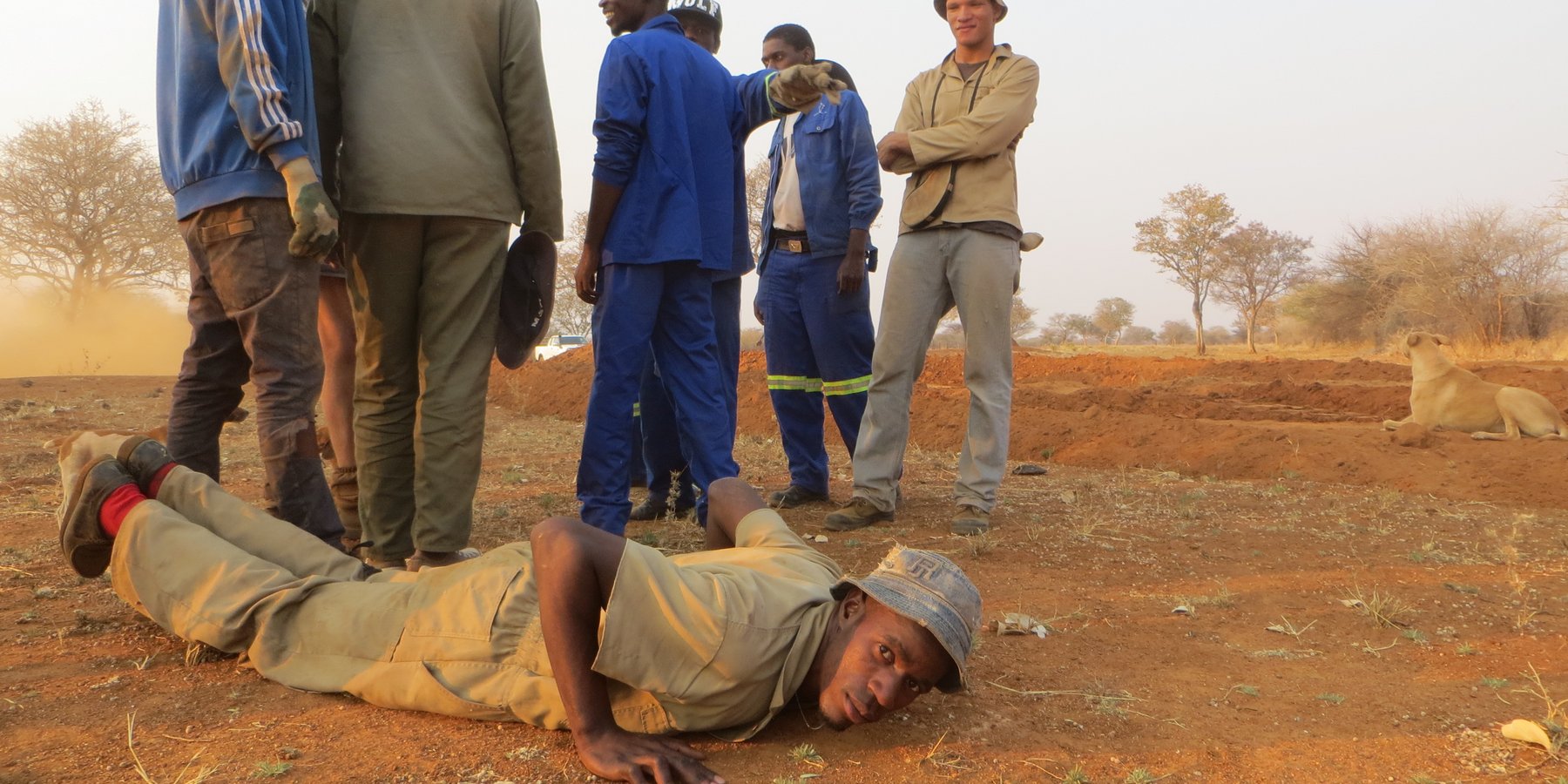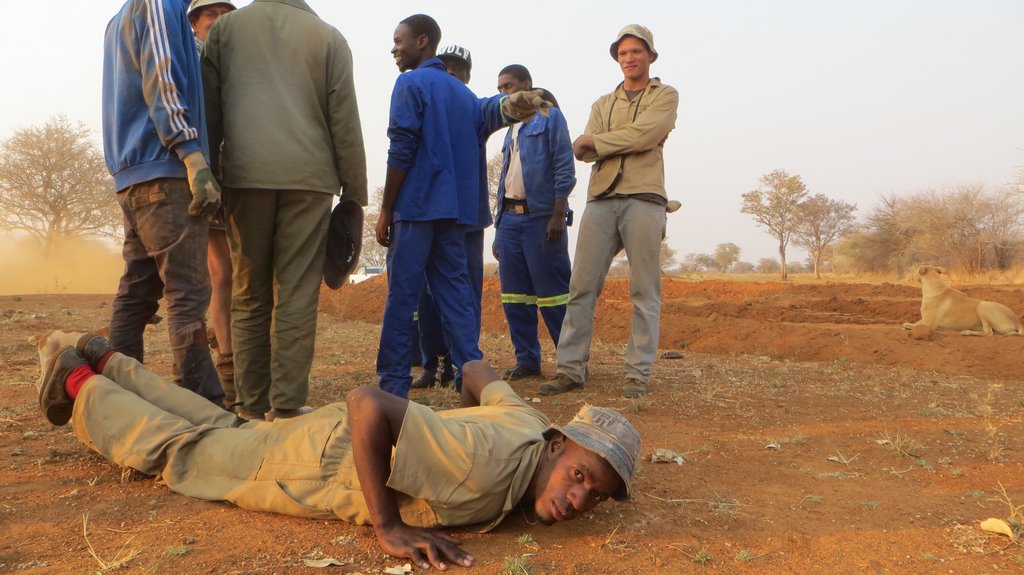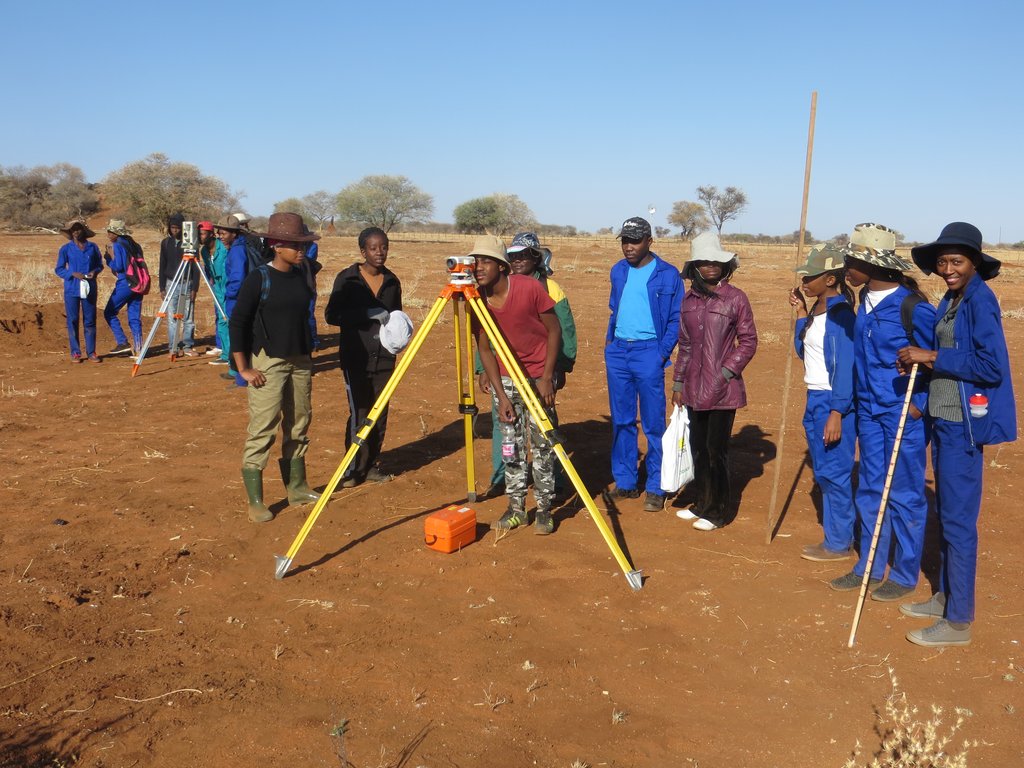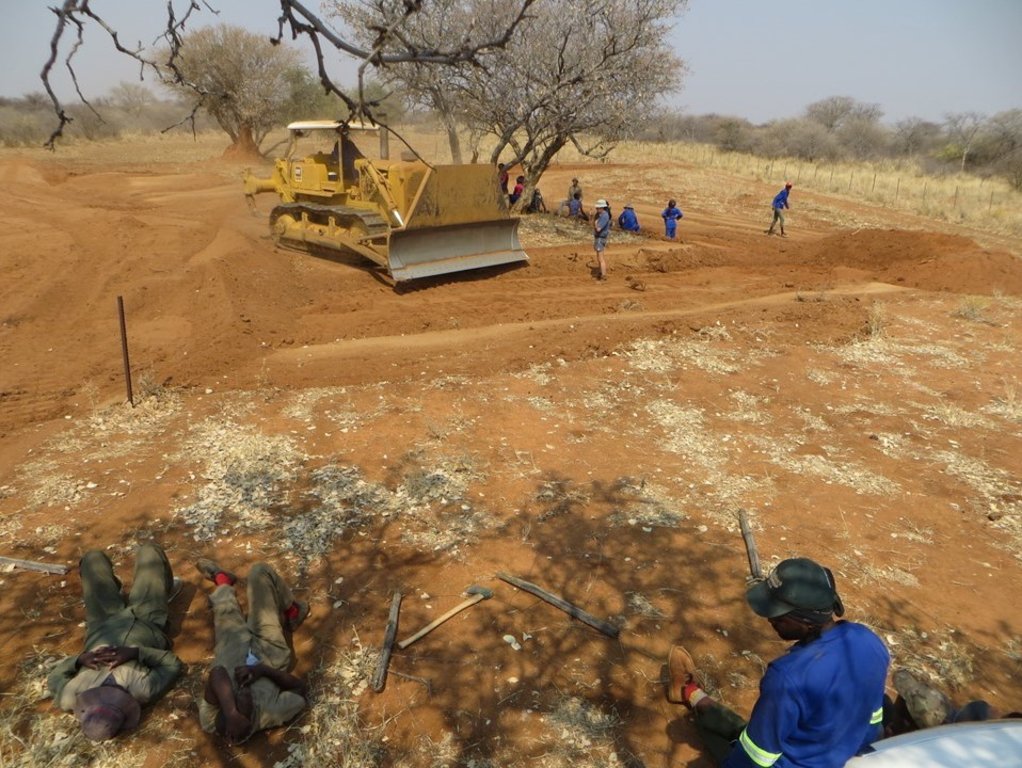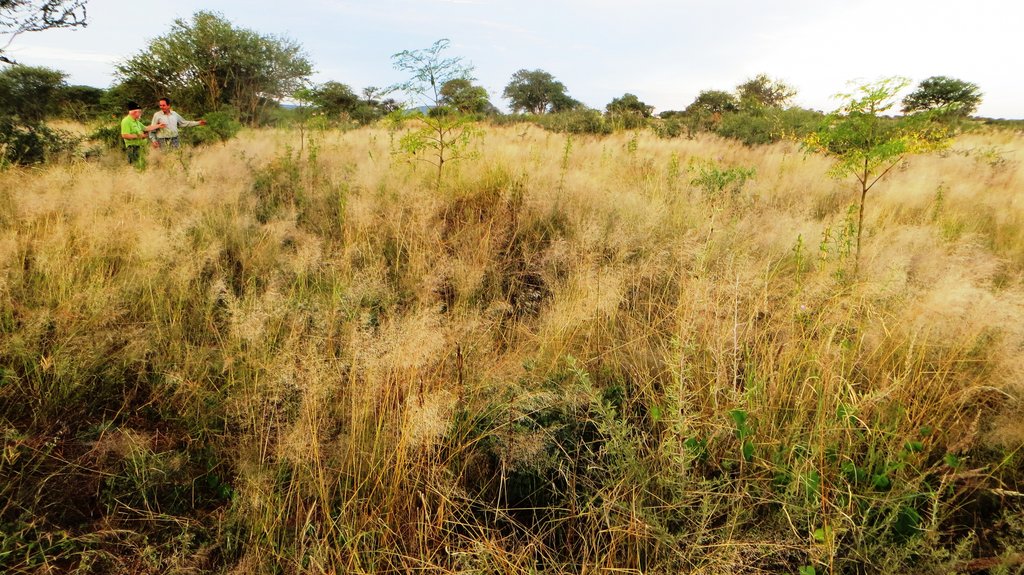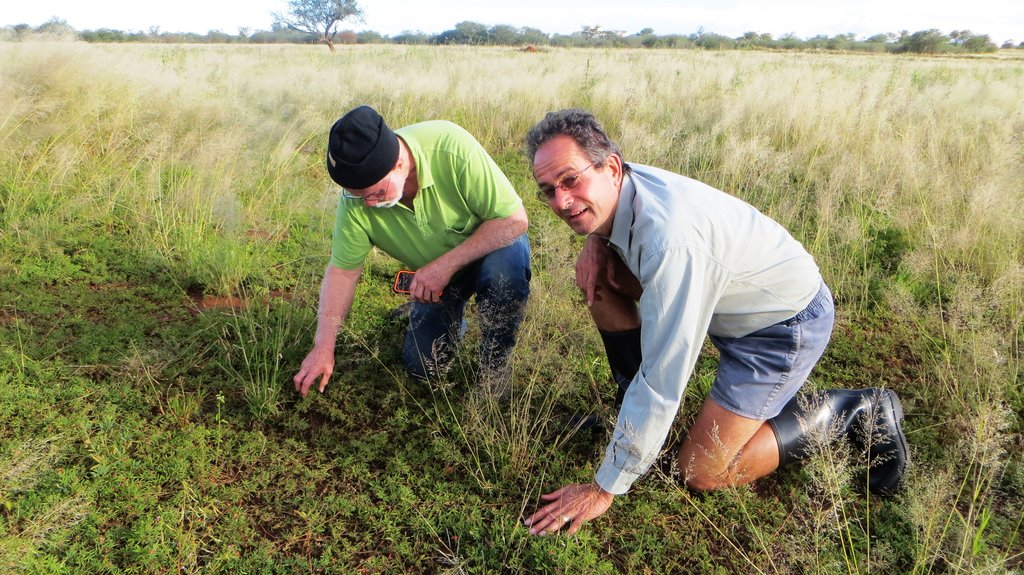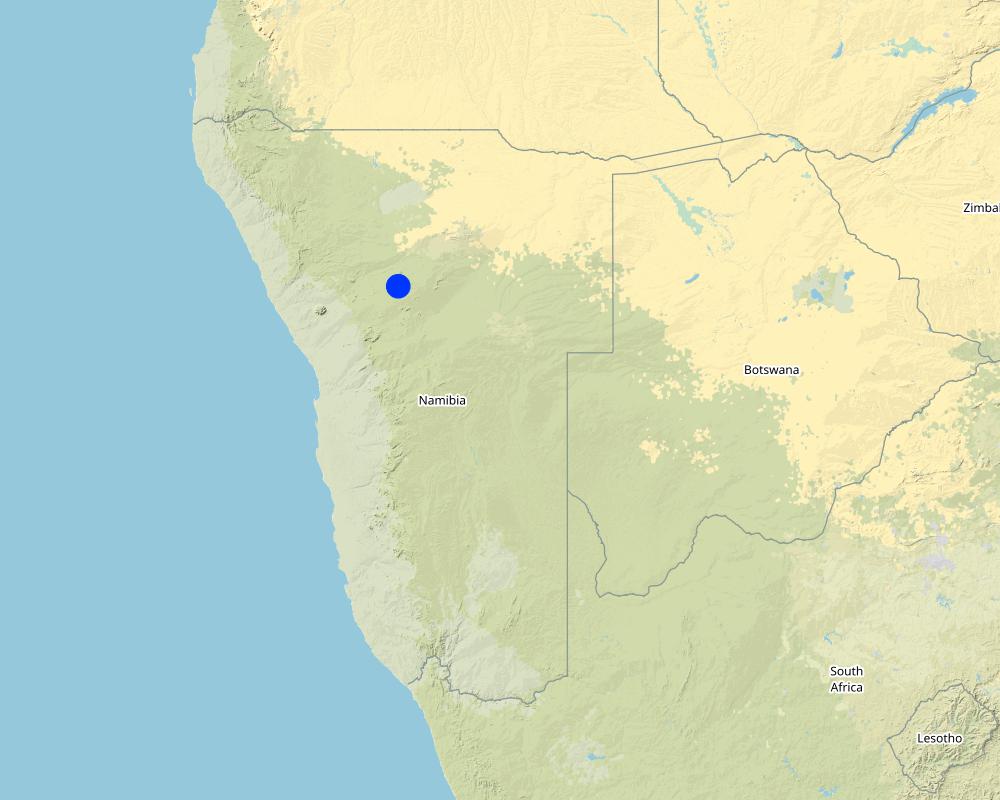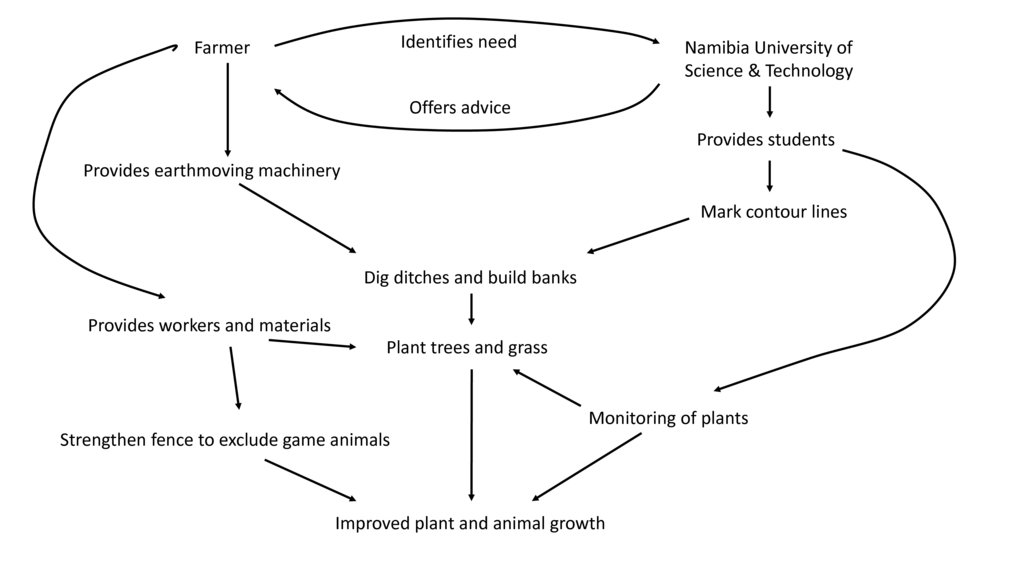Arrangements to convert degraded rangeland into fruitful landscape [ប្រទេសណាមីប៊ី]
- ការបង្កើត៖
- បច្ចុប្បន្នភាព
- អ្នកចងក្រង៖ Ibo Zimmermann
- អ្នកកែសម្រួល៖ –
- អ្នកត្រួតពិនិត្យច្រើនទៀត៖ Rima Mekdaschi Studer, Joana Eichenberger
Otjikunino
approaches_2847 - ប្រទេសណាមីប៊ី
- សង្ខេបជា PDF
- សេចក្តីសង្ខេបពេញលេញជាទម្រង់ PDF សម្រាប់បោះពុម្ព
- សេចក្តីសង្ខេបពេញលេញទម្រង់អ៊ីនធឺនេត
- សេចក្តីសង្ខេបពេញលេញ (មិនមានទម្រង់ជាក់លាក់)
- Arrangements to convert degraded rangeland into fruitful landscape: 3 ខែ មករា ឆ្នាំ 2018 (inactive)
- Arrangements to convert degraded rangeland into fruitful landscape: 22 ខែ កុម្ភៈ ឆ្នាំ 2018 (inactive)
- Arrangements to convert degraded rangeland into fruitful landscape: 2 ខែ វិច្ឆិកា ឆ្នាំ 2021 (public)
ពិនិត្យមើលគ្រប់ផ្នែក
ពង្រីកមើលទាំងអស់ បង្រួមទាំងអស់1. ព័ត៌មានទូទៅ
1.2 ព័ត៌មានលម្អិតពីបុគ្គលសំខាន់ៗ និងស្ថាប័នដែលចូលរួមក្នុងការវាយតម្លៃ និងចងក្រងឯកសារនៃវិធីសាស្ត្រផ្សព្វផ្សាយ
អ្នកប្រើប្រាស់ដី:
Kahl Uwe
+264 67 290004 / +264811486666
uwe2008@iway.na
Farm Middelplaats
P.O. Box 213 Otjiwarongo
ប្រទេសណាមីប៊ី
អ្នកជំនាញឯកទេស SLM:
Pringle Hugh
hpringle1@bigpond.com
Ecosystem Management Understanding
P.O. Box 8522 Alice Springs NT 0871
ប្រទេសអូស្ត្រាលី
ឈ្មោះគម្រោងដែលបានចងក្រងឯកសារ/ វាយតម្លៃលើវិធីសាស្ត្រផ្សព្វផ្សាយ (បើទាក់ទង)
Southern African Science Service Centre for climate change and Adaptive Land management (SASSCAL)ឈ្មោះគម្រោងដែលបានចងក្រងឯកសារ/ វាយតម្លៃលើវិធីសាស្ត្រផ្សព្វផ្សាយ (បើទាក់ទង)
Book project: Guidelines to Rangeland Management in Sub-Saharan Africa (Rangeland Management)ឈ្មោះអង្គភាពមួយ (ច្រើន) ដែលបានចងក្រងឯកសារ/ វាយតម្លៃលើវិធីសាស្ត្រផ្សព្វផ្សាយ (បើទាក់ទង)
Namibia University of Science and Technology ( NUST) - ប្រទេសណាមីប៊ីឈ្មោះអង្គភាពមួយ (ច្រើន) ដែលបានចងក្រងឯកសារ/ វាយតម្លៃលើវិធីសាស្ត្រផ្សព្វផ្សាយ (បើទាក់ទង)
German Federal Ministry of Education and Research (BMBF) - ប្រទេសអាល្លឺម៉ង់1.3 លក្ខខណ្ឌទាក់ទងទៅនឹងការប្រើប្រាស់ទិន្នន័យដែលបានចងក្រងតាមរយៈវ៉ូខេត
តើពេលណាដែលទិន្នន័យបានចងក្រង (នៅទីវាល)?
2017
អ្នកចងក្រង និង(បុគ្គលសំខាន់ៗ)យល់ព្រមទទួលយកនូវលក្ខខណ្ឌនានាទាក់ទងទៅនឹងការប្រើប្រាស់ទិន្នន័យដែលបានចងក្រងតាមរយៈ វ៉ូខេត:
បាទ/ចា៎
1.4 ការយោងមួយ (ច្រើន) ទៅលើ (កម្រង) បញ្ជីសំណួរនៃបច្ចេកទេស SLM
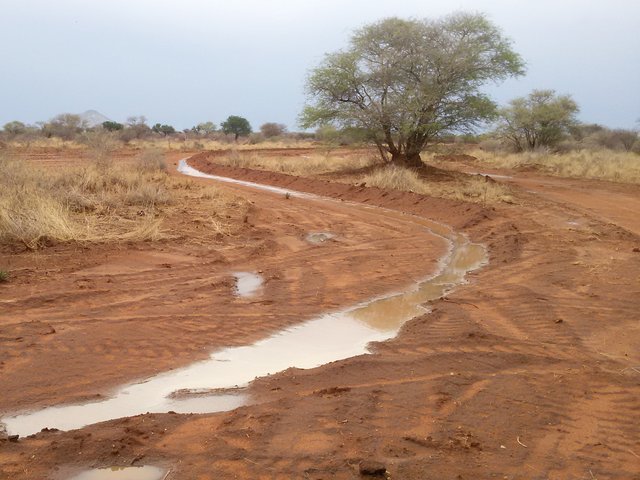
Infiltration ditches and ponding banks [ប្រទេសណាមីប៊ី]
Construction of contour ditches and ponding banks/ bunds to trap rainwater for infiltration. Improved growth of plants and replenishment of groundwater is promoted, while safely discharging excess water to avoid erosion. Integrated with other technologies that treat the root causes of rangeland degradation - rather than a stand-alone technology.
- អ្នកចងក្រង៖ Ibo Zimmermann
2. ការពណ៌នាអំពីវិធីសាស្ត្រផ្សព្វផ្សាយ SLM
2.1 ពណ៌នាសង្ខេបខ្លីពីវិធីសាស្ត្រផ្សព្វផ្សាយ
Making arrangements between a commercial farmer and agriculture students to raise the productivity of rangeland - through managing runoff to grow multipurpose trees and bushes.
2.2 ពណ៌នាលម្អិតពិវិធីសាស្ត្រផ្សព្វផ្សាយ
ពណ៌នាលម្អិតពិវិធីសាស្ត្រផ្សព្វផ្សាយ:
The approach was to form linkages between the Namibia University of Science and Technology (NUST) and a large-scale commercial farmer to improve the efficiency of rainwater on rangeland. This was technically achieved by reducing runoff while increasing infiltration and transpiration. The objective is to share knowledge and experiences gained by the farmer to grow valuable woody plants, grass and herbs, which students could then apply elsewhere. Since the approach is applied in parts of the rangeland that experience high runoff, one of the first stages of implementation is to address the root causes of erosion - if not already in place. This could be through sound grazing management that provides sufficient rest for grasses to replenish food reserves after grazing. In turn this maintains grasses in a nutritious, leafy stage of growth. If infrastructure such as a farm road or dam has concentrated runoff water, then this too needs to be addressed, by spreading the runoff over gentle and wide portions of the landscape. Thereafter, an appropriate site is identified based largely on the local knowledge of the farmer. A variety of circumstances are taken into account to select the appropriate site, such as one that (a) receives considerable runoff rainwater, (b) has sufficiently deep soil for earthmoving and (c) proximity to where the farmer lives to enable more intensive management than that required by normal rangeland. Contour lines and gentle gradients are then laid out, whether by dumpy or laser level as was done by NUST students, or generated by analysis of aerial photographs taken by drone. Earthmoving equipment is then used for digging ditches and raising bunds or ponding banks to harvest rainwater. For smaller areas or where labour is plentiful, the contour ditches can be dug by hand – as was done by students on the campus of Katutura Youth Enterprise Centre (KAYEC) in Windhoek. After enough rain had fallen to sufficiently moisten the soil below contour ditches, tree seedlings were planted. This was done by farm workers and students at both the Middelplaats farm and KAYEC. Trees included large canopy species, shorter thornless types for “chop and drop” mulching and those that produce fruits or edible leaves. While the banks become crucial fertile patches in this arid landscape, they also act as broad barriers to sheet flow, slowing it down and increasing infiltration rates locally. Thus degraded “leaky landscapes” turn into “sponge landscapes” and restore deeper and more persistent soil moisture. The greatest cost, for earthmoving, was borne by the farmer. NUST paid for its students to visit the farm, sometimes supported by the landscape literacy project of SASSCAL funded by the German BMBF, which also brought in a technical advisor.
2.3 រូបភាពនៃវិធីសាស្ត្រផ្សព្វផ្សាយ
2.4 វីឌីអូនៃវិធីសាស្ត្រផ្សព្វផ្សាយ
ការពណ៌នាសង្ខេប:
Only a short section in the film from 18m07s to 19m15s
https://www.youtube.com/watch?v=6C4V_Cib8ts
កាលបរិច្ឆេទ:
08/04/2015
ទីតាំង:
Farm Middelplaats and KAYEC campus, both in Namibia
ឈ្មោះអ្នកថតវីឌីអូ:
Andrew Botelle
2.5 ប្រទេស/តំបន់/ទីតាំងកន្លែង ដែលវិធីសាស្ត្រផ្សព្វផ្សាយត្រូវបានអនុវត្តន៍
ប្រទេស:
ប្រទេសណាមីប៊ី
តំបន់/រដ្ឋ/ខេត្ត:
Otjozondjupa
បញ្ជាក់បន្ថែមពីលក្ខណៈនៃទីតាំង:
Farm Middelplaats
មតិយោបល់:
The point is at the homestead of Farm Middelplaats
Map
×2.6 កាលបរិច្ឆេទនៃការចាប់ផ្តើម និងបញ្ចប់នៃវិធីសាស្រ្តផ្សព្វផ្សាយនេះ
សូមបញ្ជាក់ឆ្នាំដែលបានបង្កើតឡើង:
2014
ឆ្នាំបញ្ចប់ (ប្រសិនបើវិធីសាស្ត្រផ្សព្វផ្សាយត្រូវបានឈប់ប្រើប្រាស់):
1900
2.7 ប្រភេទនៃវិធីសាស្ត្រផ្សព្វផ្សាយ
- អ្នកផ្តួចផ្តើមក្នុងតំបន់/អ្នករុករកឃើញថ្មីៗ
2.8 គោលបំណង/ទិសដៅសំខាន់នៃវិធីសាស្ត្រផ្សព្វផ្សាយ
To make arrangements between a university and a farmer to improve rainwater efficiency in rangeland for growing valuable trees, grass and herbs for multiple use.
2.9 លក្ខខណ្ឌអនុញ្ញាត ឬរារាំងការអនុវត្តន៍បច្ចេកទេសដែលស្ថិតនៅក្រោមវិធីសាស្រ្តផ្សព្វផ្សាយ
សង្គម/វប្បធម៌/ និងតម្លៃនៃសាសនា
- រារាំង
Viewed with scepticism by some conventional farmers, who do not believe that rainwater harvesting can be cost-effective in rangeland.
ភាពអាចរកបាននៃធនធានហិរញ្ញវត្ថុ និងសេវាកម្ម
- រារាំង
May be difficult to convince lenders of repayment potential.
បរិបទនៃស្ថាប័ន
- អំណោយផល
The Namibia University of Science and Technology appreciates the valuable experience that its students can gain through this approach.
ការសហការ/ការសម្របសម្រួលតួអង្គពាក់ព័ន្ធ
- អំណោយផល
A trustworthy relationship has developed.
ក្របខណ្ឌច្បាប់ (សិទ្ធិកាន់កាប់ដីធ្លី កម្មសិទ្ធីប្រើប្រាស់ដីនិងទឹក)
- អំណោយផល
Freehold land is being used.
អភិបាលកិច្ចដី (ការសម្រេចចិត្ត ការអនុវត្ត និងការរឹតបន្តឹង)
- អំណោយផល
Under control of willing farmer at Middelplaats.
- រារាំង
Engineers dug a trench at KAYEC to drain water off the land, thus defeating the purpose of rainwater harvesting ditches constructed by students.
ចំណេះដឹងស្តីពី SLM និងការទទួលបានការគាំទ្រផ្នែកបច្ចេកទេស
- អំណោយផល
There is willingness to gain further experience through experimentation
ទីផ្សារ (ទិញធាតុចូល លក់ផលិតផល) និងតម្លៃ
- អំណោយផល
There is demand for the diverse products from fruitful landscapes.
ទំហំការងារ ភាពអាចរកបាននៃកម្លាំងពលកម្ម
- អំណោយផល
Farmer has access to earthmoving equipment with good operators.
- រារាំង
A road grader is not big enough for the job. The ideal machine is a CAT 14 bulldozer.
3. ការចូលរួម និងតួនាទីរបស់ភាគីពាក់ព័ន្ធ
3.1 អ្នកពាក់ព័ន្ធដែលបានចូលរួមក្នុងវិធីសាស្ត្រផ្សព្វផ្សាយ និងតួនាទីរបស់ពួកគេ
- អ្នកប្រើប្រាស់ដីក្នុងតំបន់/សហគមន៍
Farmer.
Implements the activities.
- អ្នកឯកទេសគ្រប់គ្រងដីប្រកបដោយចីរភាព/ទីប្រឹក្សាបច្ចេកទេសកសិកម្ម
Two staff of the Namibia University of Science and Technology (NUST).
Advise on technicalities.
- អ្នកស្រាវជ្រាវ
Students of the Namibia University of Science and Technology (NUST).
Monitoring effectiveness of the technology.
- គ្រូបង្រៀន/សិស្សក្មេងៗ/សិស្ស-និស្សិត
Classes of students of the Namibia University of Science and Technology (NUST).
Mark out contour lines where the technology is to be implemented.
- អង្គការអន្តរជាតិ
Southern African Science Service Centre for climate change and Adaptive Land management.
Funds an international advisor and students to participate in the project.
3.2 ការចូលរួមរបស់អ្នកប្រើប្រាស់ដីក្នុងតំបន់/ សហគមន៍ក្នុងតំបន់ក្នុងដំណាក់កាលផ្សេងគ្នានៃវិធីសាស្រ្តផ្សព្វផ្សាយ
| ការចូលរួមរបស់អ្នកប្រើប្រាស់ដីក្នុងតំបន់/សហគមន៍ក្នុងតំបន់ | សូមបញ្ជាក់នរណាត្រូវបានចូលរួម ព្រមទាំងពណ៌នាសកម្មភាពទាំងនោះ | |
|---|---|---|
| ការចាប់ផ្តើម/ការលើកទឹកចិត្ត | អន្តរកម្ម | Farmer requested advice from NUST and discussions took place. |
| ការរៀបចំផែនការ | អន្តរកម្ម | A plan was drawn up through collaboration between farmer and advisers. |
| ការអនុវត្តន៍ | អន្តរកម្ម | NUST students marked out contour lines. Farmer organised construction of infrastructure, planting of trees and their irrigation. |
| ការត្រួតពិនិត្យ និងវាយតម្លៃ | អន្តរកម្ម | Farmer keeps records of activities and students track tree survival and growth. |
3.3 គំនូសបំព្រួញ (ប្រសិនបើមាន)
ការពណ៌នា:
Linkages between farmer and university to convert rangeland into fruitful landscape.
អ្នកនិពន្ធ:
Ibo Zimmermann
3.4 ការសម្រេចចិត្តលើការជ្រើសរើសបច្ចេកទេស SLM
សូមបញ្ជាក់តើអ្នកណាជាអ្នកបានសម្រេចចិត្តក្នុងការជ្រើសរើសបច្ចេកទេសដើម្បីយកមកអនុវត្តន៍:
- គ្រប់ភាគីពាក់ព័ន្ធទាំងអស់ដែលជាផ្នែកនៃវិធីសាស្រ្តផ្សព្វផ្សាយដោយមានការចូលរួម
ចូរពន្យល់:
The farmer of Middelplaats asked for advice from NUST, discussions were held, a plan was jointly drafted, followed by implementation by both farmer and students and advisers of NUST. Informal reviews are held annually where key issues are discussed and the project is “tweaked”.
សូមបញ្ជាក់ តើការសម្រេចធ្វើឡើងដោយផ្អែកលើអ្វីជាមូលដ្ឋាន:
- វាយតម្លៃទៅលើចំណេះដឹងស្តីអំពី SLM ដែលបានចងក្រងជាឯកសារបានត្រឹមត្រូវ (ផ្អែកលើភស្តុតាងជាមូលដ្ឋានដើម្បីសម្រេចចិត្ត)
- លទ្ធផលបានពីការស្រាវជ្រាវ
- បទពិសោធន៍ និងគំនិតផ្ទាល់ខ្លួន(ពុំមានចងក្រងជាឯកសារ)
- External experts' visits and suggestions
4. ជំនួយបច្ចេកទេស ការកសាងសមត្ថភាព និងការគ្រប់គ្រងចំណេះដឹង
4.1 ការកសាងសមត្ថភាព/ បណ្តុះបណ្តាល
តើវគ្គបណ្តុះបណ្តាលបានផ្តល់ឱ្យអ្នកប្រើប្រាស់ដី/អ្នកពាក់ព័ន្ធផ្សេងៗទៀតដែរឬទេ?
បាទ/ចា៎
សូមបញ្ជាក់តើអ្នកណាត្រូវបានបណ្តុះបណ្តាល:
- អ្នកប្រើប្រាស់ដី
- បុគ្គលិកចុះទីវាល/អ្នកផ្តល់ប្រឹក្សាយោបល់
- Students
ទម្រង់នៃការបណ្តុះបណ្តាល:
- អនុវត្តន៍ជាមួយការងារ
- វគ្គបណ្តុះបណ្តាល
ប្រធានបទបណ្តុះបណ្តាល:
Theory of rangeland science, water cycling and landscape literacy. Practical observational skills and use of dumpy and laser levels.
មតិយោបល់:
The farmer was trained in planning banks with a laser level, as were two staff in marking contour lines. The machine operator was trained in earthworks.
4.2 សេវាផ្តល់ប្រឹក្សាយោបល់
តើអ្នកប្រើប្រាស់ដីបានទទួលនូវសេវាផ្តល់ប្រឹក្សាដែរ ឬទេ?
បាទ/ចា៎
សូមបញ្ជាក់ប្រសិនបើសេវាកម្មប្រឹក្សាយោបល់ត្រូវបានផ្តល់ឱ្យ:
- នៅលើដីរបស់អ្នកប្រើប្រាស់ដី
ពណ៌នា/ពន្យល់:
The farmer could potentially offer an advisory service to other farmers based on experiences gained.
4.3 ការពង្រឹងសមត្ថភាពស្ថាប័ន (ការអភិរឌ្ឍន៍អង្គភាព)
តើស្ថាប័នទាំងអស់ត្រូវបានបង្កើតឡើង ឬពង្រឹងសមត្ថភាពតាមរយៈវិធីសាស្ត្រផ្សព្វផ្សាយដែរ ឬទេ?
- ទេ
4.4 ការត្រួតពិនិត្យ និងវាយតម្លៃ
តើការត្រួតពិនិត្យ និងវាយតម្លៃគឺជាផ្នែកមួយនៃវិធីសាស្ត្រដែរឬទេ?
បាទ/ចា៎
ប្រសិន បាទ/ច៎ា តើឯកសារនេះបានបង្កើតឡើងក្នុងគោលបំណងប្រើប្រាស់សម្រាប់ការត្រួតពិនិត្យ និងវាយតម្លៃដែរឬទេ?
ទេ
4.5 ការស្រាវជ្រាវ
តើការស្រាវជ្រាវ គឺជាផ្នែកមួយនៃវិធីសាស្រ្តដែរឬទេ?
បាទ/ចា៎
បញ្ជាក់ប្រធានបទ:
- សេដ្ឋកិច្ច/ទីផ្សារ
- បរិស្ថានវិទ្យា
សូមផ្តល់ព័ត៌មានបន្ថែមទៀតឱ្យបានលម្អិត និងចង្អុលបង្ហាញនរណាដែលបានធ្វើការស្រាវជ្រាវ:
Small research projects are carried out by students of the Namibia University of Science and Technology to fulfil requirements for their course work.
5. ថវិកា និងសម្ភារៈឧបត្ថម្ភពីខាងក្រៅ
5.1 ថវិកាប្រចាំឆ្នាំសម្រាប់ផ្សព្វផ្សាយ SLM
ប្រសិនបើចំនួនពិតប្រាកដនៃថវិកាប្រចាំឆ្នាំមិនត្រូវបានដឹងច្បាស់ សូមប្រាប់ពីចន្លោះនៃថវិកានោះ:
- 2,000-10,000
មតិយោបល់ (ឧ. ប្រភពសំខាន់នៃមូលនិធិ/ម្ចាស់ជំនួយចំបង):
Mostly paid for by farmer, for operation of earthmoving equipment, which will not need to be repeated annually. A small amount for fieldwork by students and advisors paid from SASSCAL research funds.
5.2 ការគាំទ្រផ្នែកហិរញ្ញវត្ថុ / សម្ភារៈដែលបានផ្តល់ទៅឱ្យអ្នកប្រើប្រាស់ដី
តើអ្នកប្រើប្រាស់ដីបានទទួលការគាំទ្រផ្នែកហិរញ្ញវត្ថ/សម្ភារៈសម្រាប់ការអនុវត្តន៍បច្ចេកទេសដែរឬទេ:
ទេ
5.3 សូមបញ្ជាក់ពីធាតុចូលត្រូវបានផ្តល់បដិភាគ (រួមទាំងកម្លាំងពលកម្ម)
- ផ្សេងៗ
| ផ្សេងៗ (បញ្ចាក់) | កម្រិតទំហំប៉ុណ្ណា | សូមបញ្ជាក់ពីការបដិភាគ |
|---|---|---|
| Marking of contour lines | Done as part of student training |
ប្រសិនបើកម្លាំងពលកម្មធ្វើដោយអ្នកប្រើប្រាស់ដី តើវាជាធាតុចូលដ៏សំខាន់មួយដែរ ឬទេ:
- បង់ជាសាច់ប្រាក់
មតិយោបល់:
Fully paid by farmer at Middelplaats, but provided at KAYEC by students as part of their training.
5.4 ឥណទាន
តើឥណទានដែលបានផ្តល់នៅក្រោមវិធីសាស្ត្រផ្សព្វផ្សាយសម្រាប់សកម្មភាព SLM នេះយ៉ាងដូចម្តេច?
ទេ
5.5 ការលើកទឹកចិត្ត ឬវិធីសាស្ត្រដ៏ទៃទៀត
តើមានការលើកទឹកចិត្តផ្សេងទៀត ឬឧបករណ៍ប្រើប្រាស់ដើម្បីលើកកម្ពស់ការអនុវត្តន៍បច្ចេកទេស SLM?
បាទ/ចា៎
បើបាទ/ចា៎ សូមបញ្ជាក់:
Advice was provided on implementation, and contour lines were marked out by students.
6. ការវិភាគរកផលប៉ះពាល់ និងសេចក្តីសន្និដ្ឋាន
6.1 ផលប៉ះពាល់នៃវិធីសាស្ត្រផ្សព្វផ្សាយ
តើវិធីសាស្ត្រផ្សព្វផ្សាយបានផ្តល់សិទ្ធិអំណាចដល់អ្នកប្រើប្រាស់ដី ធ្វើឱ្យប្រសើរឡើងនូវការចួលរួមអ្នកពាក់ព័ន្ធ?
- ទេ
- បាទ/ច៎ា បន្តិចបន្តួច
- បាទ/ច៎ា ជាមធ្យម
- បាទ/ច៎ា បានខ្លាំង
Only one farmer and his workers have been deeply involved. Others have been briefly exposed to the project.
តើវិធីសាស្រ្តផ្សព្វផ្សាយនេះអនុញ្ញាតឱ្យធ្វើការសម្រេចចិត្ដដោយផ្អែកលើភស្តុតាងជាមូលដ្ឋានដែរ ឬទេ?
- ទេ
- បាទ/ច៎ា បន្តិចបន្តួច
- បាទ/ច៎ា ជាមធ្យម
- បាទ/ច៎ា បានខ្លាំង
Records of tree survival determined the need for initial irrigation.
តើវិធីសាស្ត្រផ្សព្វផ្សាយជួយអ្នកប្រើប្រាស់ដីដើម្បីអនុវត្តន៍ និងថែទាំបច្ចេកទេស SLM?
- ទេ
- បាទ/ច៎ា បន្តិចបន្តួច
- បាទ/ច៎ា ជាមធ្យម
- បាទ/ច៎ា បានខ្លាំង
By advising the farmer at different stages of implementation.
តើវិធីសាស្រ្តផ្សព្វផ្សាយនេះធ្វើឱ្យប្រសើរឡើងនូវការសម្របសម្រួលនិងការអនុវត្តចំណាយរបស់ SLMមានប្រសិទ្ធិភាពបែបណា? :
- ទេ
- បាទ/ច៎ា បន្តិចបន្តួច
- បាទ/ច៎ា ជាមធ្យម
- បាទ/ច៎ា បានខ្លាំង
At a key meeting it was agreed that grazing pressure from horses and wildlife was holding back the project.
តើវិធីសាស្ត្រផ្សព្វផ្សាយនេះធ្វើឱ្យចំណេះដឹងប្រសើឡើង និងសមត្ថភាពរបស់អ្នកប្រើប្រាស់ដីក្នុងការអនុវត្តន៏ SLM?
- ទេ
- បាទ/ច៎ា បន្តិចបន្តួច
- បាទ/ច៎ា ជាមធ្យម
- បាទ/ច៎ា បានខ្លាំង
Experience gained by farmer and workers, and exposure to some other farmers.
តើវីធីសាស្ត្រផ្សព្វផ្សាយនេះពង្រឹងចំណេះដឹង និងកសាងសមត្ថភាពរបស់អ្នកពាក់ព័ន្ធឬទេ?
- ទេ
- បាទ/ច៎ា បន្តិចបន្តួច
- បាទ/ច៎ា ជាមធ្យម
- បាទ/ច៎ា បានខ្លាំង
NUST students gained experience and understanding.
តើវិធីសាស្ត្រផ្សព្វផ្សាយ បានធ្វើឱ្យប្រសើរឡើងសមភាពយេនឌ័រ និងផ្តល់សិទិ្ធអំណាចដល់ស្ត្រី និងក្មេងស្រី?
- ទេ
- បាទ/ច៎ា បន្តិចបន្តួច
- បាទ/ច៎ា ជាមធ្យម
- បាទ/ច៎ា បានខ្លាំង
Students who participated included many females.
តើវិធីសាស្ត្រផ្សព្វផ្សាយនាំឱ្យប្រសើរឡើងនូវសន្តិសុខស្បៀង/ធ្វើឱ្យប្រសើរឡើងនូវអាហាររូបត្ថម្ភ?
- ទេ
- បាទ/ច៎ា បន្តិចបន្តួច
- បាទ/ច៎ា ជាមធ្យម
- បាទ/ច៎ា បានខ្លាំង
Growth of fruit/edible leaf/fodder trees, such as Moringa oleifera, and improved forage.
តើវិធីសាស្ត្រផ្សព្វផ្សាយនេះនាំឱ្យមានភាពប្រសើរឡើងក្នុងការទទួលបានទឹក និងអនាម័យ?
- ទេ
- បាទ/ច៎ា បន្តិចបន្តួច
- បាទ/ច៎ា ជាមធ្យម
- បាទ/ច៎ា បានខ្លាំង
Improved infiltration replenishes groundwater, which is used by both people and animals for drinking, and lush forage reduces drinking by livestock.
តើវិធីសាស្ត្របានធ្វើឱ្យប្រសើរឡើងនូវការកសាងសមត្ថភាពរបស់អ្នកប្រើប្រាស់ដីដើម្បីបន្សុំាទៅនឹងការប្រែប្រួលអាកាសធាតុ/អាកាសធាតុក្តៅហែង និងកាត់បន្ថាយគ្រោះមហន្តរាយទាក់ទឹងនឹងអាកាសធាតុ?
- ទេ
- បាទ/ច៎ា បន្តិចបន្តួច
- បាទ/ច៎ា ជាមធ្យម
- បាទ/ច៎ា បានខ្លាំង
Improved rainwater -use efficiency on small part of farm.
តើវិធីសាស្ត្រផ្សព្វផ្សាយនេះនាំឱ្យមានការងារ ឱកាសរកប្រាក់ចំណូល?
- ទេ
- បាទ/ច៎ា បន្តិចបន្តួច
- បាទ/ច៎ា ជាមធ្យម
- បាទ/ច៎ា បានខ្លាំង
Saleable products such as Moringa leaves.
6.2 ការលើកទឹកចិត្តចម្បងៗរបស់អ្នកប្រើប្រាស់ដីសម្រាប់ការអនុវត្តបច្ចេកទេស SLM
- បង្កើនផលិតកម្ម
Grass and trees grow better where rainwater infiltrated
- បង្កើនប្រាក់ចំណេញ (សមត្ថភាព) បង្កើនអត្រាចំណេញ
More of better quality forage
- ការកាត់បន្ថយការធ្លាក់ចុះគុណភាពដី
Better plant cover and soil biology
- កាត់បន្ថយហានិភ័យនៃគ្រោះមហន្តរាយ
Improved buffering against drought
- ពង្រឹងស្មារតីផ្នែកបរិស្ថាន
By students and farm workers are exposed to the approach
- លើកកម្ពស់ចំណេះដឹង និងជំនាញ SLM
By students and farm workers are exposed to the approach
- ការកែលម្អសោភ័ណ្ឌភាព
Less bare ground and a more diverse landscape with reduction in extremes of temperature
6.3 សកម្មភាពផ្សព្វផ្សាយដែលប្រកបដោយចីរភាព
តើអ្នកប្រើប្រាស់ដីអាចធ្វើឱ្យមានចីរភាពនូវអ្វីដែលត្រូវបានអនុវត្តន៍តាមរយៈវិធីសាស្ត្រផ្សព្វផ្សាយដែរឬទេ(ដោយពុំមានការគាំទ្រពីអ្នកខាងក្រៅ)?
- បាទ/ចា៎
ប្រសិនបាទ/ច៎ា សូមរៀបរាប់ថាធ្វើយ៉ាងម៉េច:
The farmer will continue to finance the maintenance work, the costs of which are expected to be covered by the increase in production.
6.4 ភាពខ្លាំង/ គុណសម្បត្តិនៃវិធីសាស្ត្រផ្សព្វផ្សាយ
| ភាពខ្លាំង/ គុណសម្បត្តិ/ ឱកាស ទស្សនៈរបស់អ្នកប្រើប្រាស់ដី |
|---|
| Advice from the university is appreciated. |
| Marking out of contour lines by students is appreciated. |
| ភាពខ្លាំង/ គុណសម្បត្តិ/ ឱកាស ទស្សនៈរបស់បុគ្គលសំខាន់ៗ |
|---|
| Students gain useful experience on the farm. |
6.5 ភាពខ្សោយ/ គុណវិបត្តិនៃវិធីសាស្ត្រ និងរកដំណោះស្រាយ
| ភាពខ្សោយ/ គុណវិបត្តិ/ ហានិភ័យ ទស្សនៈរបស់អ្នកប្រើប្រាស់ដី | តើបច្ចេកទេសទាំងនោះបានដោះស្រាយបញ្ហាដូចម្តេច? |
|---|---|
| Students are not always available at the optimal times of the year. | By training farm workers to mark out contour lines. |
| ភាពខ្សោយ/ គុណវិបត្តិ/ ហានិភ័យក្នុងទស្សនៈរបស់បុគ្គលសំខាន់ៗ | តើបច្ចេកទេសទាំងនោះបានដោះស្រាយបញ្ហាដូចម្តេច? |
|---|---|
| Students might make mistakes, as they are still learning. | Prepare students well and check their work. |
7. ឯកសារយោង និងវេបសាយ
7.1 វិធីសាស្ត្រ/ ប្រភពនៃព័ត៌មាន
- តាមការចុះទីវាល ការស្រាវជ្រាវនៅទីវាល
As part of ongoing cooperation
- Participation in fieldwork and e-mail communication with land user and specialist
Participation in fieldwork and e-mail communication with land user and specialist
7.2 ឯកសារយោងដែលបានចេញផ្សាយ
ចំណងជើង អ្នកនិពន្ធ ឆ្នាំ ISBN:
Back from the brink, Andrews, 2006, 0-7333-1962-9
មានប្រភពមកពីណា? ថ្លៃដើមប៉ុន្មាន?
https://www.amazon.com/Back-Brink-Australias-Landscape-Saved/dp/0733319629 $37
ចំណងជើង អ្នកនិពន្ធ ឆ្នាំ ISBN:
Beyond the brink, Andrews, 2008, 978-0733324109
មានប្រភពមកពីណា? ថ្លៃដើមប៉ុន្មាន?
https://www.amazon.com/Beyond-Brink-Sustainable-Australian-Landscape/dp/073332410X $59
ចំណងជើង អ្នកនិពន្ធ ឆ្នាំ ISBN:
Rainwater harvesting for drylands and beyond: Vol 1 – Guiding principles to welcome rainfall into your life and landscape, Lancaster, 2009, 978-0-9772464-0-3
មានប្រភពមកពីណា? ថ្លៃដើមប៉ុន្មាន?
https://www.amazon.com/Rainwater-Harvesting-Drylands-Beyond-2nd/dp/0977246434 $20
7.3 ចូលទៅទាញយកឯកសារពាក់ព័ន្ធដែលមានលើបណ្តាញអ៊ិនធឺណែត
ចំណងជើង/ ពណ៌នា:
Principles of natual sequence farming
វេបសាយ:
http://www.nsfarming.com/principles.html
ចំណងជើង/ ពណ៌នា:
Rangeland Rehydration
វេបសាយ:
www.emulandrecovery.org.au
ការតភ្ជាប់ និងម៉ូឌុល
ពង្រីកមើលទាំងអស់ បង្រួមទាំងអស់ការតភ្ជាប់

Infiltration ditches and ponding banks [ប្រទេសណាមីប៊ី]
Construction of contour ditches and ponding banks/ bunds to trap rainwater for infiltration. Improved growth of plants and replenishment of groundwater is promoted, while safely discharging excess water to avoid erosion. Integrated with other technologies that treat the root causes of rangeland degradation - rather than a stand-alone technology.
- អ្នកចងក្រង៖ Ibo Zimmermann
ម៉ូឌុល
គ្មានម៉ូឌុល


